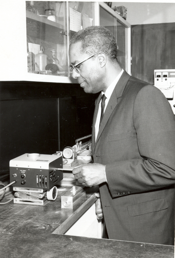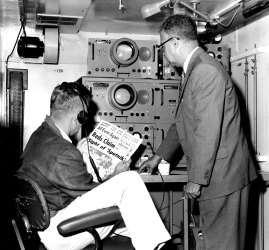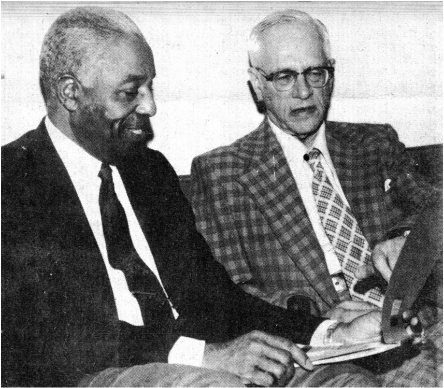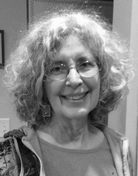
In recognition of African American History Month, I thought I'd say a few words about two Camp Evans scientists who did great things and who, in different ways, touched my life as a child of Project Diana.
The first is Walter Samuel McAfee (1914-1995), mathematician and theoretical physicist. After graduating from Ohio State University, he began his career in 1939 as a junior high school physics teacher in Columbus, OH. Then, in 1942, he was recruited to fill an opening for a civilian physicist at the Army Signal Corps. He quit his teaching job with some trepidation, because contrary to usual practice, the application form had not required a photograph and he wasn't sure what would happen when his new employers discovered he was African American. What a relief to find other desks already occupied by African Americans when he arrived.
When work on Project Diana began, McAfee was charged by DeWitt and his team with predicting the moon's position at a given moment in time by calculating its speed relative to that of the earth. Anyone who remembers word problems from high school math can relate to the issue: If a small heavenly body (let's call it the moon) is traveling in a certain direction at a certain speed, and you are positioned on a much larger heavenly body (let's call it the earth) moving in a different direction at a different speed, where do you aim your radar beam if you want to hit the moon a second or so later? Though the problem is conceptually straightforward, the mathematics are far from simple (especially remembering that said moon is traveling not in a straight line but in orbit around said earth) and in fact had foiled a previous moon bounce attempt by DeWitt in 1940. McAfee was the one who carried out this elegant work and provided the computations crucial to Project Diana's ultimate success. He was the only scientist outside the core engineering team singled out for particular acknowledgment by DeWitt and Stodola, in their 1949 report on Project Diana, citing his role in resolving "echoing-area problems." McAfee stayed at Camp Evans for the remainder of his career - 42 years - and in 2015 was posthumously inducted into U.S. Army Materiel Command's Hall of Fame, the first African American to be so honored.

A little research confirmed that Bill indeed had an illustrious career. Half a generation older than McAfee and my father, he had already held a variety of high-profile positions by the time he arrived at Camp Evans - working as Engineer with radio station WTAG in Worcester, MA, serving as a Navy Radioman aboard the coastal steamer SS Edith, and setting up radio communications for the Metropolitan District Police in Boston. The following excerpt from his obituary gives a good sense for the scope of his career at the Signal Corps Labs: "Coming to Fort Monmouth in 1940, he was responsible for the installation and operation of early warning radar systems on the West Coast of the U.S. During the 1950s, Mr. Gould directed research-involving instrumentation of long-range guided missiles at Cape Canaveral. Before his retirement in 1969 he was a section chief in the Electronic Warfare Laboratory, directing research and development involving the application of radio and radar for meteorological purposes. During his 29-year career he contributed to the development of radar equipment from the old spark gap transmitter to the vacuum tube and the modern solid state devices."
An interesting sidelight: In 1958, Bill came across the diary of his grandfather William B. Gould in the attic of his family's home in Dedham, MA. The first William B. Gould had escaped from slavery and subsequently fought in the Civil War, and although the pages of the old diary were crumbling in his fingers, Bill recognized its importance and managed to rescue it from oblivion. After his death in 1983, Leah Gould gave the document to their son Bill IV, who himself has had a distinguished career as professor of law at Stanford University. Bill IV introduced and annotated the diary, which in 2002 was published under the title of Diary of a Contraband: The Civil War Passage of a Black Sailor and dedicated to the memory of his father, "the greatest man that I ever knew."
I'm happy to have had the privilege not only of celebrating the groundbreaking work of Walter S. McAfee, but also of tracking down William B. Gould III, whose life and work lend quiet support to the proposition that excellence, given even a little encouragement, will out.


 RSS Feed
RSS Feed